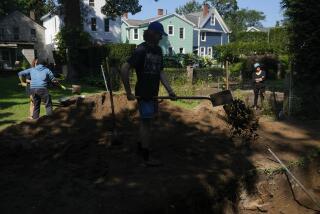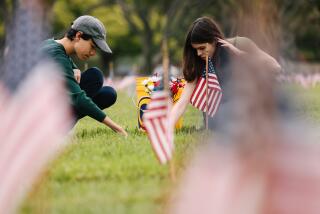Honoring their Chinese forebears
The politics of burying and respecting the dead was at the heart of Saturday’s traditional Ch’ing Ming festival, an annual Chinese event at which families visit their loved one’s burial place.
Mounted by the Chinese Historical Society, the festival at the historic Chinese shrine in Boyle Heights’ Evergreen Cemetery is meant to honor those buried there nearly a century ago.
But for the last year, Los Angeles’ Chinese American community has been consumed with what to do with the remains unearthed by the Metropolitan Transportation Authority three years ago during construction of the Gold Line extension not far from the site of Saturday’s festival.
Some want the century-old bones, believed to be those of Chinese railroad workers, reburied quickly. Others argue that the remains -- and the artifacts found alongside them -- should be studied before they are returned to the earth.
Although a decision has not yet been made, politicians and historians who gathered at Saturday’s event still had plenty to say.
One was South Pasadena Councilman Mike Ten, who has set up a fund and hopes to raise $100,000 so Cal State L.A. can properly study the unearthed bones and artifacts.
“There are so many things you can find out with DNA,” he said. “You have to be aggressive with your history.”
Another was Assemblyman Mike Eng (D-Monterey Park), who urged the roughly 50 people gathered at the shrine to support a bill that would require cultural and historical associations to be informed whenever archaeological remains are uncovered.
His bill, Eng told the crowd, is facing strong opposition from some lobbyists, who say it would slow down development in an already sluggish economy. He urged supporters to attend a first reading of the measure Tuesday in Sacramento.
As the sun broke through an overcast sky, politics gave way to the traditional event -- one that calls for a loved one’s grave to be cleaned after a harsh winter, followed by offerings of food, drinks and gifts to the dead.
Incense, wine, flowers and oranges were placed in front of the 120-year-old shrine -- offerings to the more than 1,000 Chinese immigrants buried in Evergreen Cemetery.
“People really need to care about stuff like this,” said Gary Vargas, a history teacher who came to the festival to learn more about Chinese culture. “What could be more L.A. than this gathering here?”
--
More to Read
Sign up for Essential California
The most important California stories and recommendations in your inbox every morning.
You may occasionally receive promotional content from the Los Angeles Times.










